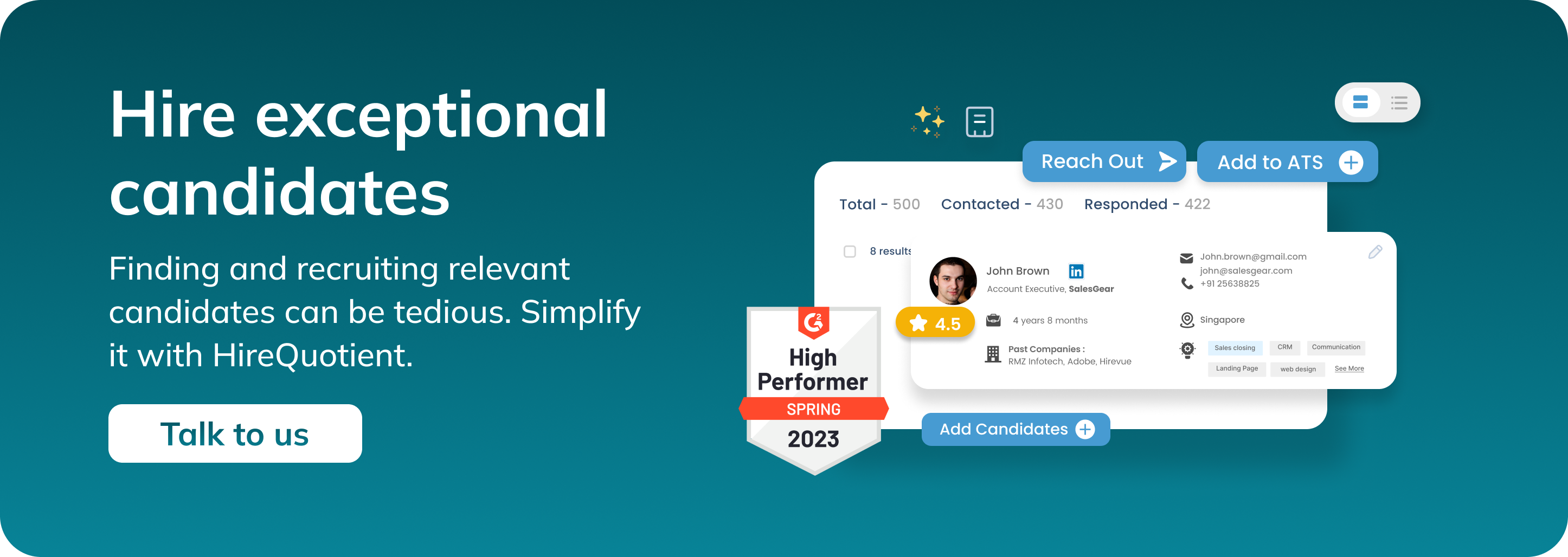How many hours is part-time? Plus a secret tool to source the best
Published on June 5th, 2024
If you're curious about part-time jobs and wondering how many hours is part-time per week, you're in the right place. Whether you're a student looking to earn some extra cash, a parent trying to balance work and family, or just someone exploring flexible work options, understanding the ins and outs of part-time employment can be super helpful.
In this article, we'll dive into what a part-time job is, how many hours you can expect to work, the kinds of schedules you might encounter, and much more. So, let's get started!
What is a Part-Time Job?
A part-time job is typically defined as any employment arrangement that requires fewer hours per week than a full-time position. While full-time employees usually work around 35 to 40 hours per week, part-time workers often have a more flexible schedule, allowing them to balance work with other commitments such as education, family, or another job. Part-time roles are common in various industries, including retail, hospitality, healthcare, and education, offering individuals an opportunity to earn income without committing to a full-time schedule.
Part-time jobs can be an excellent option for students, parents, retirees, and anyone seeking to supplement their income without the commitment of full-time employment. These jobs can vary widely in terms of duties and responsibilities, ranging from entry-level positions to more skilled roles requiring specific qualifications.
How Many Hours a Week is Part-Time?
The number of hours constituting a part-time job can vary significantly depending on the employer, industry, and country. Generally, part-time work is defined as working fewer than 35 hours per week.
However, some employers may consider any schedule below 30 hours per week as part-time. It's important to note that there is no universally accepted standard, and part-time hours can differ based on the organization's policies and the specific needs of the job.
Technology Industry
In the technology sector, part-time roles can include positions such as support specialists, developers, and project assistants. These jobs often offer flexible hours that can be adjusted based on project needs and deadlines. A part-time web developer might work 15 to 25 hours per week, with the ability to work remotely and adjust hours as needed.
Retail Industry
In the retail industry, part-time employees often work shifts that can range from as few as 5 to 20 hours per week. This flexibility allows retailers to adjust staffing levels according to peak shopping times, such as weekends, holidays, and sales events. For example, a retail cashier might work 4-hour shifts on weekends and one or two evenings during the week, totaling around 15 to 20 hours per week.
Hospitality Industry
The hospitality industry, which includes restaurants, hotels, and event planning, also relies heavily on part-time workers. These employees might work varying hours depending on customer demand and event schedules. A part-time server in a restaurant might work 3 to 5 shifts per week, each lasting 4 to 6 hours, resulting in a total of 12 to 30 hours per week. Hotel staff, such as housekeeping or front desk clerks, might have similar varying schedules based on occupancy rates.
Healthcare Industry
Part-time positions in the healthcare industry can include roles such as nursing assistants, medical receptionists, and home health aides. These roles often require more regular hours, but still less than full-time schedules. For example, a part-time nursing assistant might work 6-hour shifts, four days a week, totaling 24 hours per week. Home health aides might have even more varied hours, depending on the needs of their clients.
Education Industry
In the education sector, part-time jobs might include positions like tutors, teaching assistants, and administrative support. These roles often align with school hours or after-school programs. A part-time tutor might work 10 to 15 hours per week, typically in the afternoons or evenings. Teaching assistants might work 20 to 25 hours per week, depending on the school's requirements.
Office and Administrative Roles
Part-time office and administrative roles can be found in almost any industry. These positions might involve working half days or a few full days each week. For instance, a part-time administrative assistant might work from 9 AM to 1 PM, five days a week, totaling 20 hours per week. Alternatively, they might work full days on Mondays, Wednesdays, and Fridays, totaling 24 hours per week.
Customer Service
Customer service roles are another common area for part-time employment. Part-time customer service representatives might work evening or weekend shifts to provide coverage during peak times. For example, a customer service representative might work 4-hour shifts, five days a week, totaling 20 hours per week. Alternatively, they might work two 8-hour shifts on weekends, plus one 4-hour shift during the week, totaling 20 hours per week.
Flexibility and Business Demands
The flexibility of part-time work allows employers to adjust staffing levels according to business demands, making it a popular option in industries with fluctuating workloads. For example, retail stores may need more staff during holiday shopping seasons, while restaurants may need additional help during weekends and evenings. This adaptability benefits both employers, who can efficiently manage labor costs, and employees, who can find work that fits their schedules and other commitments.
What Kind of Work Schedule Can You Expect from Part-Time Jobs?
Part-time jobs offer a variety of schedules, providing flexibility that can be attractive to many workers. Some common types of part-time schedules include:
- Fixed Schedule: Regular, consistent hours each week. For example, a part-time employee might work from 9 AM to 1 PM weekly.
- Variable Schedule: Hours that change weekly based on the employer's needs. This type of schedule is common in retail and hospitality, where demand can vary significantly from week to week.
- Shift Work: Working specific shifts, such as mornings, evenings, or weekends. Many part-time jobs in healthcare and customer service operate on a shift basis.
- On-Call: Being available to work as needed, often with short notice. On-call workers may not have a set schedule and must be flexible to meet the employer's needs.
This flexibility can be ideal for students, parents, or anyone needing to fit work around other responsibilities. However, part-time workers must clearly communicate their availability with their employers to ensure a mutually beneficial arrangement.
Understanding Labor Laws and Teen Workers
In the United States, specific labor laws protect young workers, ensuring their safety and well-being. The Fair Labor Standards Act (FLSA) sets guidelines for teenagers (usually under 18 years old) regarding the number of hours and times they can work. These regulations are designed to prevent overworking and exploitation, safeguarding young individuals' rights and welfare.
For example, during the school year, 14- and 15-year-olds are limited to working:
- Non-school hours: No more than 3 hours on a school day and 8 hours on a non-school day.
- Weekly limit: No more than 18 hours in a school week and 40 hours in a non-school week.
- Time restrictions: Generally, work must be performed between 7 AM and 7 PM, extending to 9 PM from June 1 to Labor Day.
Parents should familiarize themselves with these laws to ensure their teenage children are working within legal limits and are not subjected to unfair treatment in the workplace. Additionally, state laws may impose further restrictions or provide additional protections, so it is essential to be aware of both federal and state regulations.
Advantages and Disadvantages of Part-Time Employees
Advantages:
- Flexibility: Part-time employees often have more flexible schedules, which can be beneficial for both employees and employers. This flexibility allows workers to balance their jobs with other commitments, such as education, family, or personal pursuits.
- Cost Savings: Employers may save on benefits and payroll costs by hiring part-time workers. For example, part-time employees may not be eligible for health insurance, retirement plans, or paid time off, reducing overall labor expenses.
- Work-Life Balance: Employees can achieve a better work-life balance, reducing stress and increasing job satisfaction. Part-time work can provide the opportunity to pursue hobbies, further education, or spend more time with family and friends.
Disadvantages:
- Reduced Benefits: Part-time employees may not receive the same benefits as full-time workers, such as health insurance and retirement plans. This can be a significant drawback for those who rely on these benefits for their well-being and financial security.
- Inconsistent Income: The variable hours of part-time work can lead to inconsistent income. Part-time workers may find it challenging to budget and plan financially due to fluctuations in their earnings.
- Limited Career Advancement: Part-time roles may offer fewer opportunities for career advancement compared to full-time positions. Employers might prioritize full-time employees for promotions, training, and professional development opportunities.
Overtime and Part-Time Workers
Overtime laws generally apply to full-time workers who exceed a standard 40-hour workweek. However, part-time employees may also be entitled to overtime pay if they work beyond the stipulated hours defined by their employer.
For instance, if a part-time worker's schedule is set at 20 hours per week and they work 30 hours one week, they might be eligible for overtime pay for the extra 10 hours, depending on company policy and local labor laws.
Part-time employees need to understand their rights regarding overtime pay. The FLSA requires employers to pay non-exempt workers time and a half for hours worked over 40 in a workweek.
Some states have additional overtime laws that may provide further protections. Workers should review their employment contracts and local labor laws to ensure they receive appropriate compensation for extra hours worked.
What Workplace Rights Do Part-Time Workers Have?
Part-time workers have many of the same workplace rights as full-time employees, ensuring fair treatment and safe working conditions. Here are some key rights:
Fair Pay and Minimum Wage
Part-time workers are entitled to at least the minimum wage as per federal, state, or local laws and must be paid for all hours worked, including training.
Overtime Pay
If part-time employees work over 40 hours in a workweek, they may be entitled to overtime pay at one and a half times their regular rate, according to the Fair Labor Standards Act (FLSA).
Safe Working Conditions
Employers must provide a safe and healthy work environment for all employees, including part-time workers, adhering to Occupational Safety and Health Administration (OSHA) standards.
Anti-Discrimination Protections
Part-time workers are protected from discrimination based on race, color, religion, sex, national origin, age, disability, or genetic information under federal laws such as Title VII, ADEA, and ADA.
Family and Medical Leave
Eligible part-time employees are entitled to unpaid, job-protected leave for certain family and medical reasons under the Family and Medical Leave Act (FMLA).
Workers' Compensation
Part-time employees are generally covered by workers' compensation laws, providing benefits for work-related injuries or illnesses.
Right to Organize
Part-time workers have the right to join or form a union and engage in collective bargaining without fear of retaliation.
Benefits Eligibility
Some employers offer prorated benefits based on hours worked, and part-time workers may be eligible for benefits mandated by state or local laws.
Protection from Retaliation
Employers cannot retaliate against part-time employees for exercising their rights, such as reporting unsafe conditions or discrimination.
Understanding these rights helps part-time workers ensure fair treatment and take appropriate action if their rights are violated.
What Jobs Are Best Suited for Part-Time Employees?
Many industries offer part-time positions, including:
- Retail: Sales associates, cashiers, stock clerks. Retail jobs often have flexible hours to accommodate varying customer traffic, making them ideal for part-time work.
- Hospitality: Servers, bartenders, hotel staff. The hospitality industry frequently hires part-time workers to cover busy periods, such as weekends and holidays.
- Healthcare: Nursing assistants, medical receptionists, home health aides. Part-time healthcare positions can provide essential support while offering flexible schedules.
- Education: Tutors, teaching assistants, administrative support. Part-time roles in education can be suitable for individuals who wish to work during school hours or on a seasonal basis.
- Customer Service: Call center agents, receptionists, technical support. Customer service positions often offer part-time schedules, especially in industries with extended hours of operation.
These roles often provide flexible scheduling options that can accommodate various lifestyles and commitments. Part-time jobs can also serve as a stepping stone to full-time employment, allowing workers to gain experience and demonstrate their capabilities to potential employers.
But here the question arises: how to hire the right part-time candidate for your company?
How to Hire the Right Part-Time Candidate
To help you hire the best, here’s introducing EasySource - powered by HireQuotient.
The best candidate sourcing software ever Source the right talent, right now. EasySource is the most advanced candidate sourcing software to find, screen, engage, and hire qualified candidates effortlessly.
Source candidates effortlessly EasySource’s candidate discovery module reads simple prompts or your job description to source relevant candidates from active and hidden talent pools. Combined with multiple high-intent signals, you get candidates who are interested in becoming a part of your organization.
Screen candidates like magic Inundated with a large volume of applicants? Use EasySource’s persona-based Candidate Screening Module to find qualified candidates in minutes. The module screens candidates based on qualitative and quantitative nuances beyond the job description so that your recruiters engage only with the most qualified candidates.
Engage candidates at scale Ever spent hours trying to draft 1-on-1 messages to qualified candidates? EasySource’s Candidate Engagement Module reads their profiles and aligns them with your job description to craft highly personalized outreach messages that tell the candidates exactly why your recruiters believe that they are the best fit for the role.
Rediscover talent from your internal pool With its easy-click integration capabilities, EasySource finds relevant candidates from your internal talent pool, screens them according to your vetting criteria, and engages them with hyper-personalized messaging across multiple channels to bring them into your recruitment pipeline.

Frequently Asked Questions
How many hours is a part-time job?
Part-time jobs typically require fewer than 35 hours per week, but this can vary by employer and industry.
How many hours is part-time in the USA?
However, labeling an employee as part-time does not change the application of FLSA requirements. The IRS, meanwhile, considers a part-time employee to be someone who works less than 30 hours per week or less than 130 hours per month.
What is the salary of a part-time job in the USA?
The minimum wage for a part-time job in the USA is USD 7.25 per hour. You can get paid per hour or make a weekly salary based on how much work you complete each week. The part-time salary you will earn will depend on a number of factors, including your industry, experience level, and geographic location.
How many hours is considered part-time?
Part-time status is usually defined as working fewer than 35 hours per week, although specific definitions can vary.
How many hours per week is part-time?
Most part-time positions involve working less than 35 hours per week, providing flexibility for those balancing other commitments.
Can part-time employees receive overtime pay?
Yes, part-time employees may receive overtime pay if they work beyond their scheduled hours and meet the criteria set by their employer or local labor laws.
What is the 1000-hour rule?
Businesses are required to offer part-time employees a standard retirement plan to all employees if they've worked at least 1,000 hours over a year, according to the Employee Retirement Income Security Act (ERISA).
Is the 20-hour rule real?
The 20-Hour Rule suggests that it takes approximately 20 hours of deliberate and focused practice to become reasonably competent in a new skill. While 20 hours may not make you an expert, it's enough to become proficient and confident in the basics of a new skill.
By understanding the nuances of part-time employment, individuals can make informed decisions about their work schedules and career paths. Whether seeking additional income, flexible hours, or work experience, part-time jobs offer diverse opportunities to meet various needs and goals.
Authors

Soujanya Varada
As a technical content writer and social media strategist, Soujanya develops and manages strategies at HireQuotient. With strong technical background and years of experience in content management, she looks for opportunities to flourish in the digital space. Soujanya is also a dance fanatic and believes in spreading light!
Hire the best without stress
Ask us how
Never Miss The Updates
We cover all recruitment, talent analytics, L&D, DEI, pre-employment, candidate screening, and hiring tools. Join our force & subscribe now!
Stay On Top Of Everything In HR



